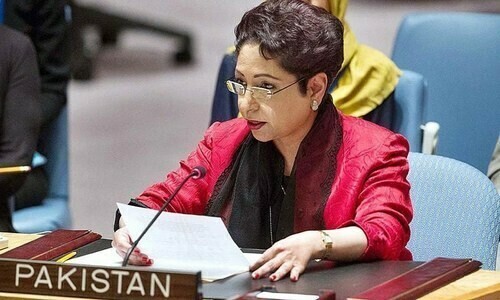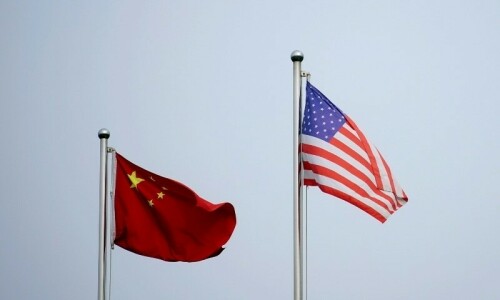Pakistan's Ambassador to Afghanistan Mansoor Khan said on Monday that an agreement had been reached with Afghan authorities to reopen the Chaman-Spin Boldak gate from tomorrow (Tuesday), nearly a month after the border crossing was closed for pedestrians and trade by the Taliban.
“As a result of a meeting between border authorities, Afghanistan and Pakistan have decided to open [the] Chaman-Boldak crossing from tomorrow for pedestrians as well as trade. The two sides will now look forward to ensuring smooth operations of the important border crossing,” Ambassador Khan told Dawn.com.
The envoy said he had recently called on Afghan Foreign Minister Amir Khan Muttaqi and, among other issues, they had discussed the need for opening the Boldak-Chaman crossing at the earliest, ensuring the facilitation of cross-border movement of people and trade vehicles on both sides, especially because it was the fruit harvest season in Afghanistan.
“We also had discussions about following up on the recent visit of the foreign minister of Pakistan to Kabul, which was extremely productive. We remain closely engaged with Afghan authorities for facilitating the movement of people at all border crossings,” he said.
According to a senior member of the Chaman Chamber of Commerce, Usman Achakzai, the decision to reopen the Chaman-Spin Boldak crossing was taken at a meeting held on the Afghan side of the border on Monday morning.
Achakzai said members of the Chaman Chamber of Commerce and security officials joined the meeting that was held in the wake of discussions between Foreign Minister Shah Mahmood Qureshi and Taliban officials in Kabul last month.
He added that the Taliban had removed blockades placed on their side of the border.
The Taliban government's deputy spokesman Bilal Karimi also confirmed to Dawn.com that both sides had reached an understanding that passengers should not face difficulties.
“Similarly, imports and exports via Chaman-Spin Boldak should continue without any hurdles. Both sides have also agreed that there should be no problem in the transit trade. We have held discussions on the issue and I am confident that a permanent solution will be found out,” Karimi said in an audio message.
The Taliban had closed the key crossing along the frontier with Afghanistan in Balochistan on October 5, claiming that “traders, patients and passengers were facing difficulties [at the border]", but Pakistan was unwilling to resolve problems despite their efforts.
Pakistani border authorities, meanwhile, maintained that the Taliban officials had not officially informed them about the reason for closing the border at Chaman, according to a Dawn report.
Another Dawn report on the matter stated that the Taliban were demanding that people from Afghanistan should be allowed to cross into Pakistan by showing their Afghan identity cards instead of being asked to show other travel documents.
At least four meetings were held between Pakistani and Afghan border authorities to address the issue but no result was yielded until now.
Moreover, a committee comprising senior civil and military officials in Balochistan was formed last month to address key issues related to cross-border movement at the Chaman-Spin Boldak gate.
The closure of the border crossing has badly affected the pomegranate farmers of Afghanistan as fresh fruit is ready for export to Pakistan.
Meanwhile, Pakistan has slashed the duty on fresh vegetables and fruit coming from Afghanistan.
Traders welcome decision
Traders in Pakistan welcomed the decision to reopen the border, highlighting that the closure of the Chaman-Spin Boldak gate had caused huge financial losses and mental distress to businessmen and farmers, whose produce had been ruined this export season.
“Taliban border security has removed the barriers from zero point on November 1, and gates will be opened for trade, cargo and pedestrian movement from November 2,” Pakistan-Afghanistan Joint Chamber of Commerce and Industry (PAJCCI) Co-chairperson Khan Jan Alokozai said in a statement issued by the forum.
According to the statement, PAJCCI Chairperson Zubair Motiwala lauded Alokozai’s efforts for the reopening of the crossing and said both Pakistan and Afghanistan “must keep communication channels open to ensure that [the] border remains open”.
He also called for immediately developing a framework to address issues arising out of the routine and force majeure border closure.
This, Motiwala explained, would avert losses to traders, safeguard the socioeconomic needs of the general public and strengthen relations between two countries.
“Issues and differences should be sorted out via table talks and border closures should be avoided at all costs,” the statement quoted him as saying.
Motiwala also emphasised the need for the Afghan government to engage in dialogue with the business community of Pakistan, “as there are still many pending problems such as the rationalisation of custom duties, usage of banking instruments and ensuring security for Pakistani businesses [while accessing] Central Asian republics”.














































